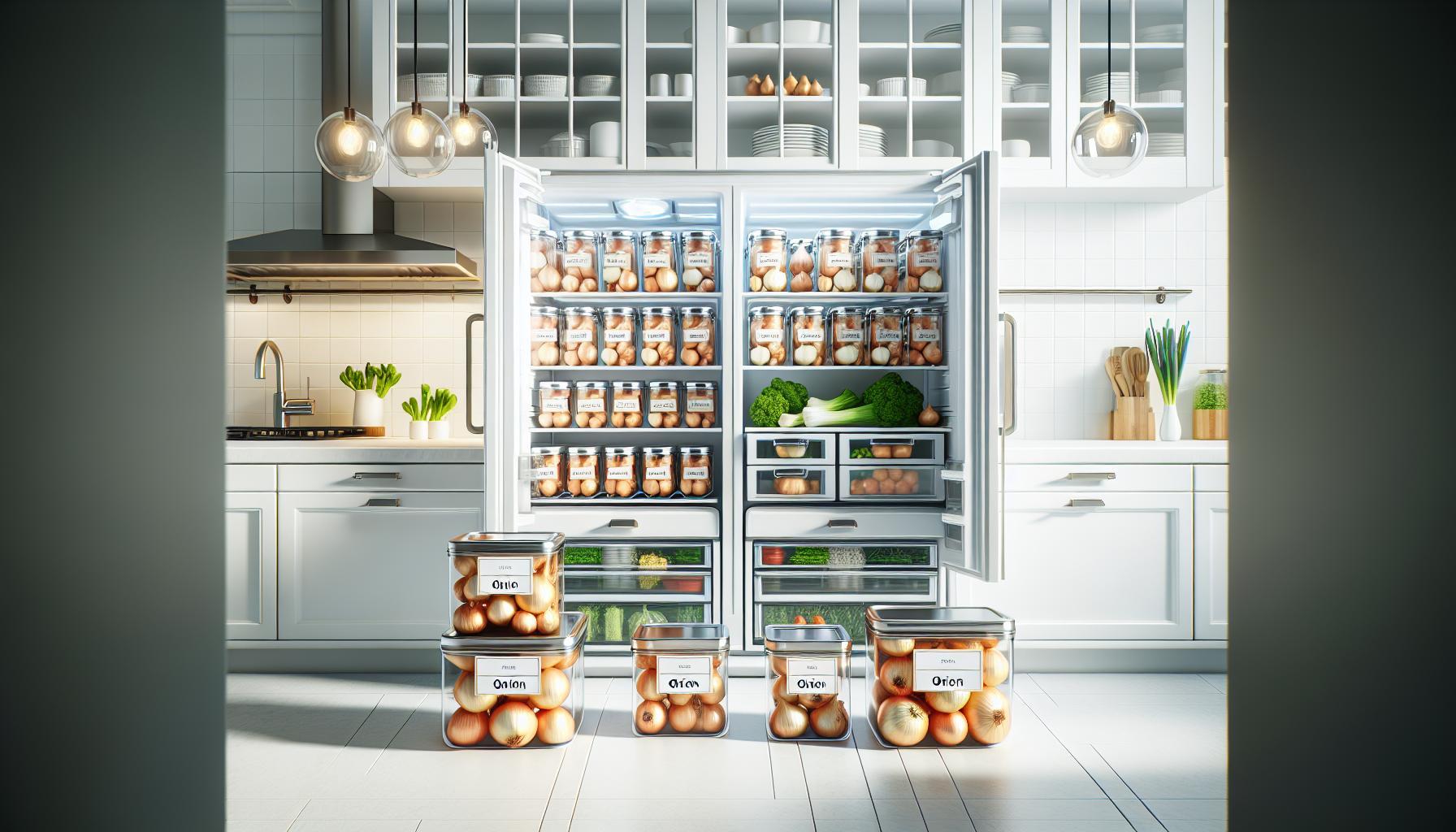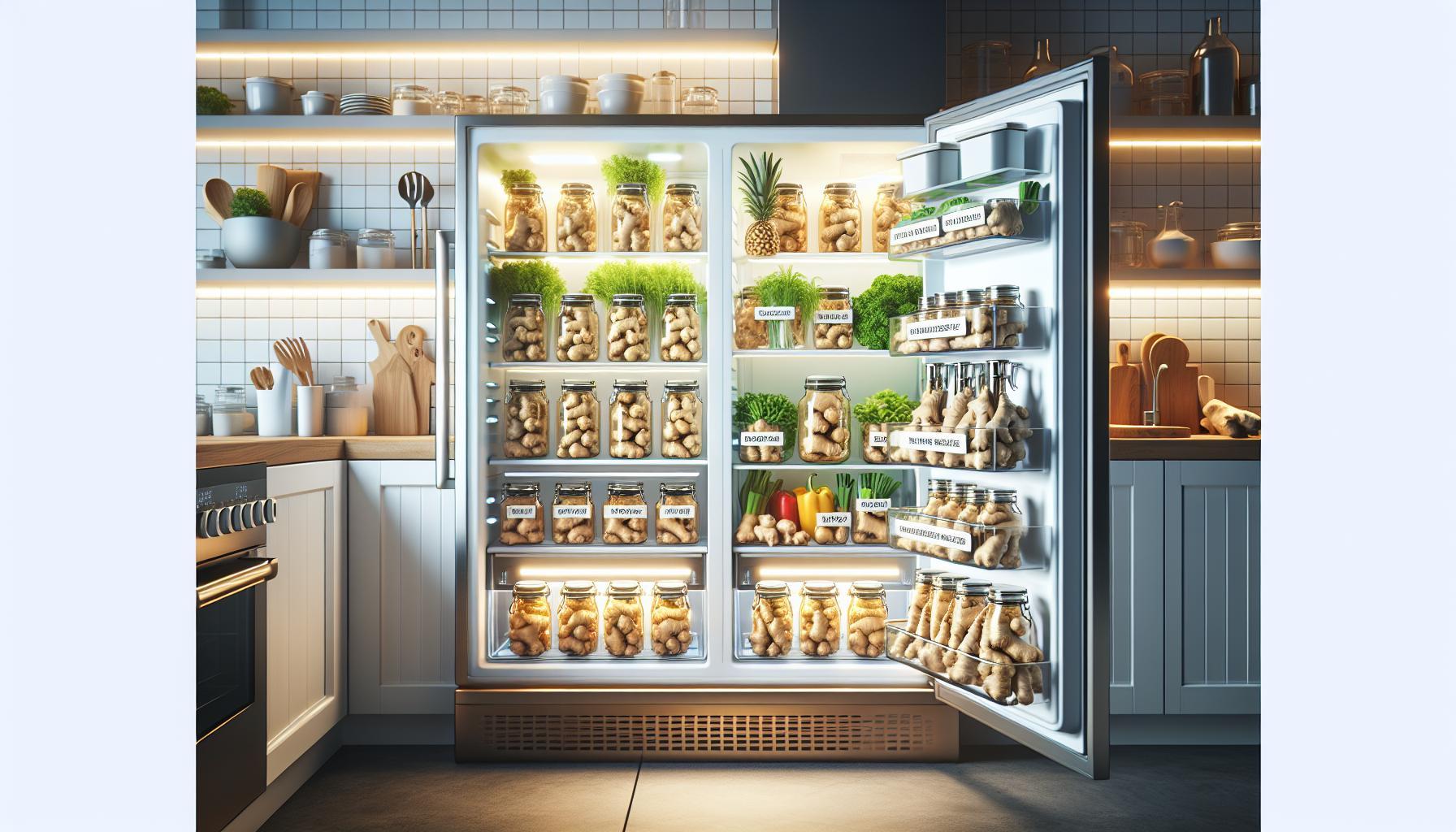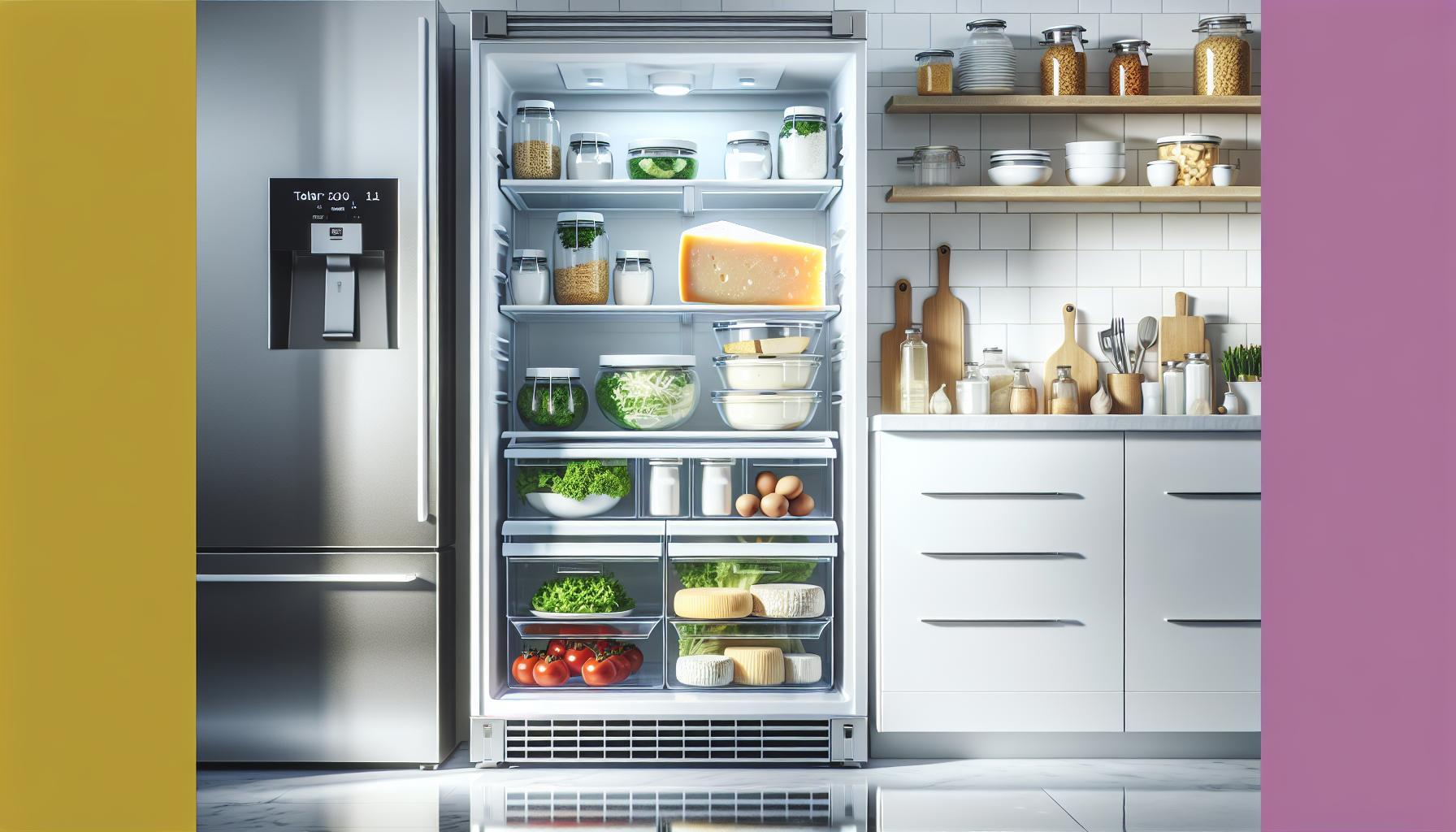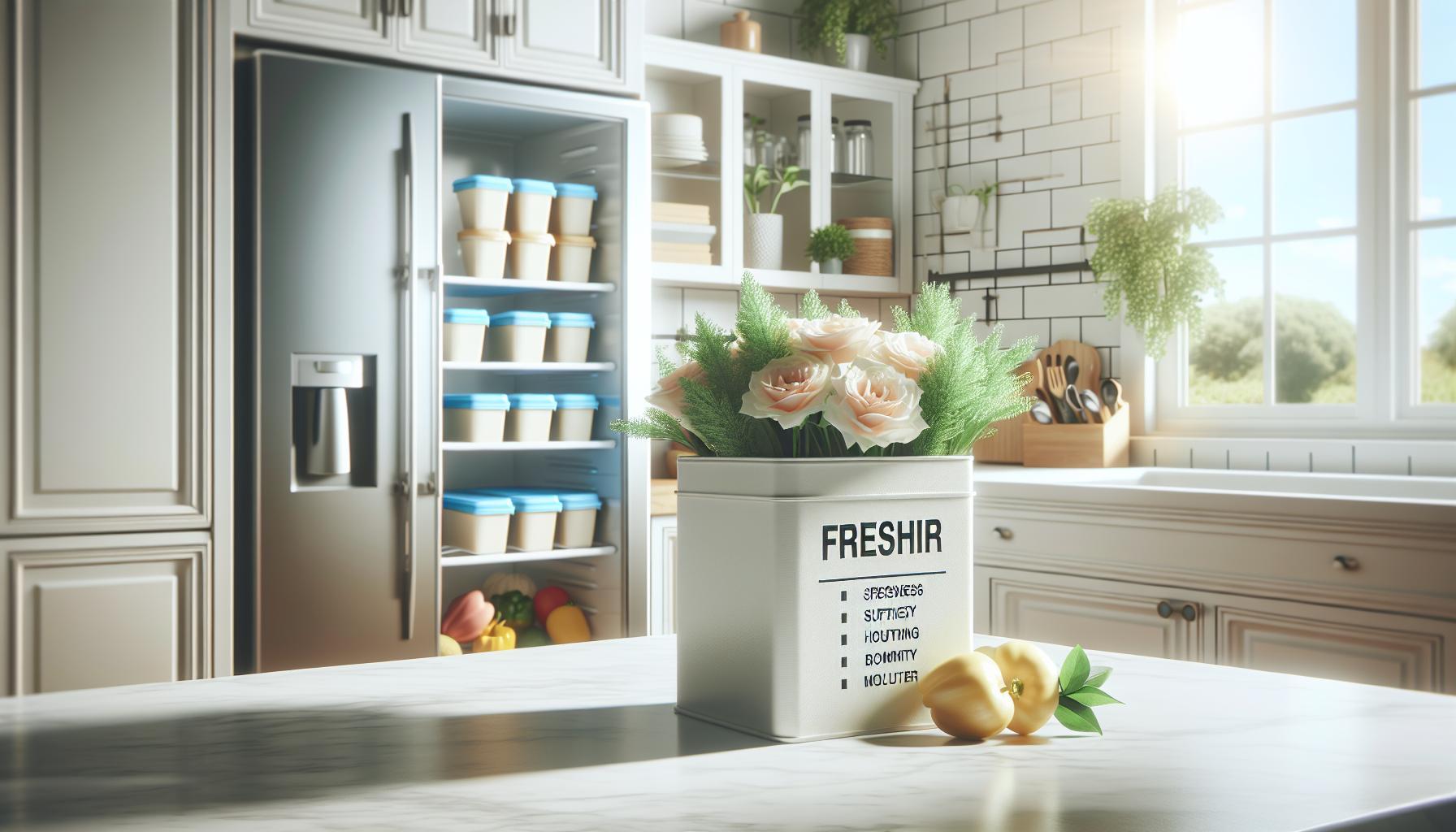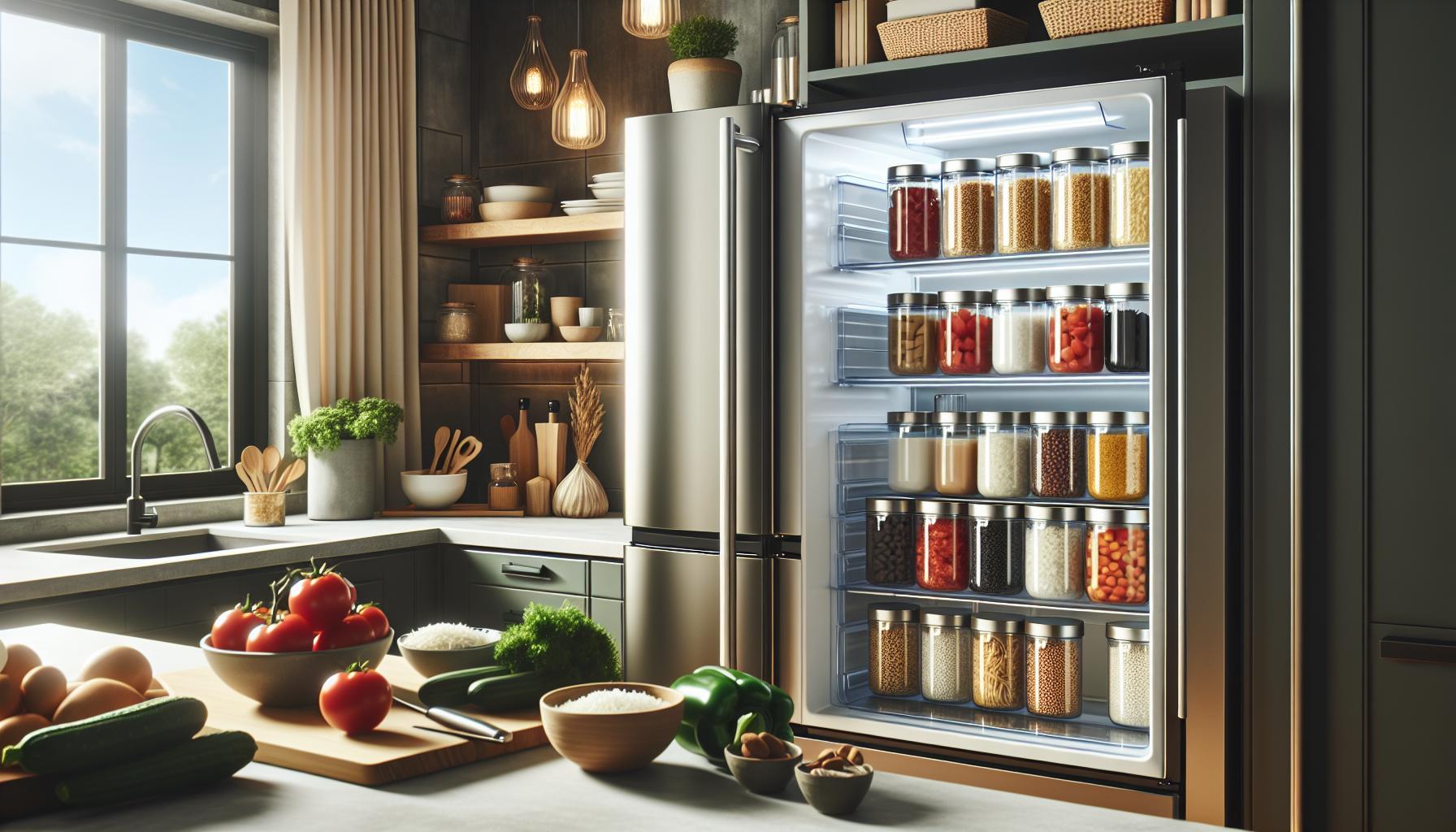Chopped onions are a staple in many kitchens, but their freshness can be surprisingly short-lived. Understanding how long they last in the fridge is essential not only for enhancing your meals but also for minimizing food waste. Did you know that stored improperly, chopped onions can spoil in just a few days?
With rising food costs and an increasing emphasis on sustainability, it’s more important than ever to make informed choices about food storage. In this article, we’ll explore the shelf life of chopped onions in the fridge, share tips for proper storage, and offer insights on when it’s time to toss them out. Continue reading to discover how simple adjustments can help you maximize the freshness of your ingredients, saving money and reducing waste in the process.
How Long Can You Keep Chopped Onions in the Fridge?
Chopped onions are a staple in many kitchens, but understanding their shelf life can be essential to both food safety and minimizing waste. When stored correctly in the refrigerator, chopped onions can typically last for about 7 to 10 days. However, several factors influence their longevity, including the storage conditions and how they were prepared. The moisture from chopped onions can lead to quicker spoilage, so it’s important to ensure they are kept in an airtight container to limit exposure to air and moisture.
To maximize the freshness and safety of your chopped onions, it is advisable to check them regularly. If you notice any off smells, discoloration, or signs of mold, it is best to discard them, as consuming spoiled onions can lead to gastrointestinal issues. Keeping your refrigerator at a consistent temperature of 40°F (4°C) or below will also help slow down the spoilage process.
For best practices in storing chopped onions, find a container that seals tightly, helping to gather any moisture and prevent the onions from absorbing other odors in the fridge. Consider temporary storage options like using beeswax wraps or plastic wrap if a container isn’t available, as these methods can also help maintain freshness for a short period. Armed with this knowledge, you can enjoy the vibrant flavor of chopped onions while ensuring they remain safe and ready for your next culinary creation.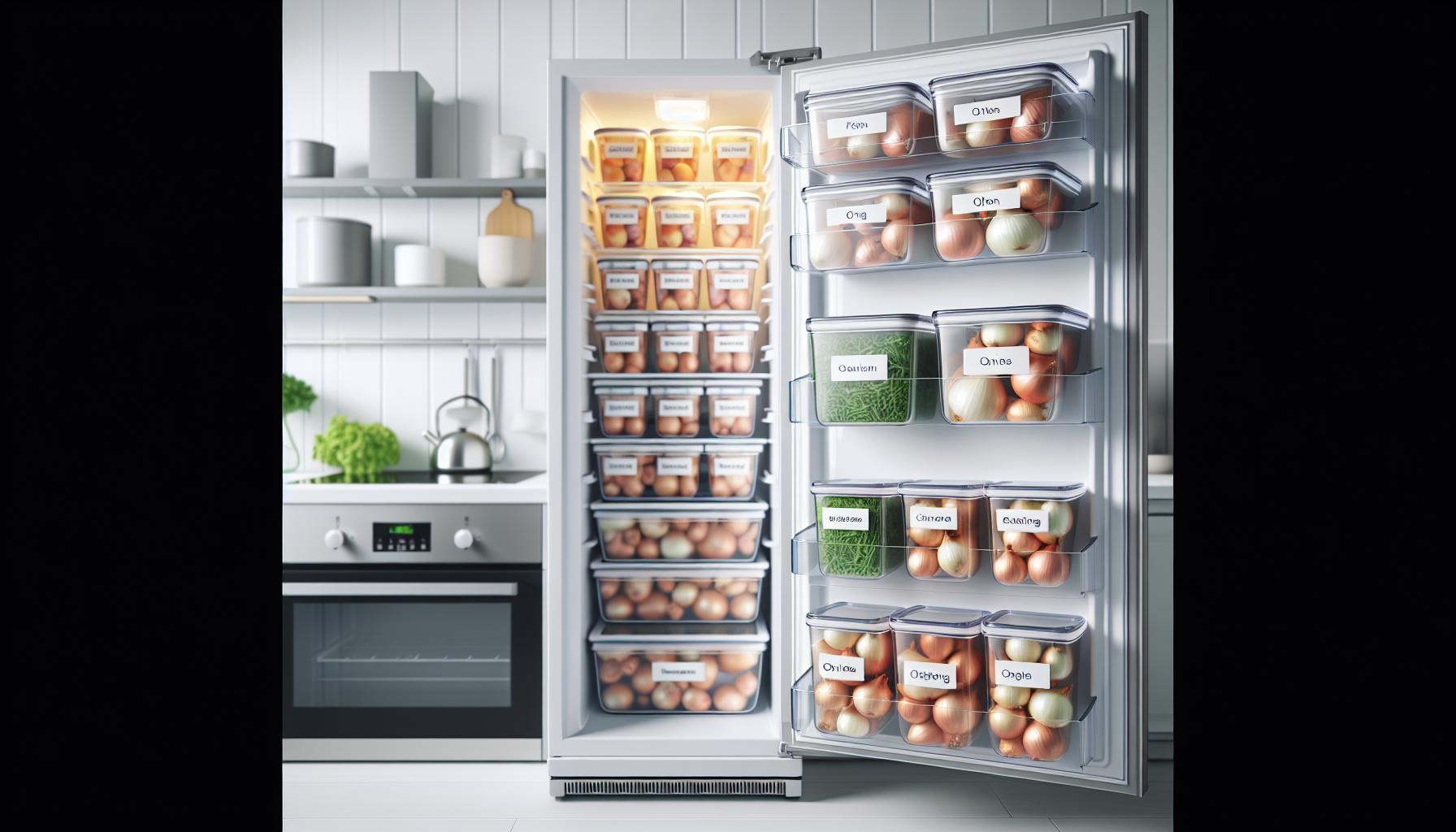
Signs of Spoiled Chopped Onions
Chopped onions are a versatile ingredient, but knowing when they have gone bad is crucial for food safety and quality. Recognizing the signs of spoilage can prevent potential health risks and help you make informed decisions about what to use and what to toss. While fresh chopped onions have a strong, pungent smell, spoiled onions may present significant changes in their aroma and appearance.
One of the primary indicators of spoiled chopped onions is a noticeable change in scent. Fresh onions should have a sharp, true onion smell, whereas spoiled ones may emit a sour or unpleasant odor. This off-putting smell is often a result of bacterial growth, signifying that the onions are no longer safe for consumption. Additionally, inspect the onions for visual signs of spoilage, such as brown or dark spots that appear slimy or mushy. If you see any fuzzy growth, which could be mold, it’s important to discard the onions immediately.
Texture is another important factor to consider. Fresh chopped onions should be firm and crisp. If they have become soft, slimy, or require excessive pressure to cut, they are likely spoiled. Moreover, any excessive moisture accumulation in the storage container can indicate that the onions are deteriorating. It’s crucial to maintain proper storage techniques to prevent such issues, but if moisture develops, it signals that the onions should be thrown out.
Lastly, if you find your chopped onions have darkened significantly or developed an off-color, it’s essential to err on the side of caution. Proper food safety is important, and consuming spoiled onions can lead to stomach discomfort or foodborne illness. Always trust your senses-smell, sight, and touch help determine if your chopped onions are still good to use in your favorite dishes.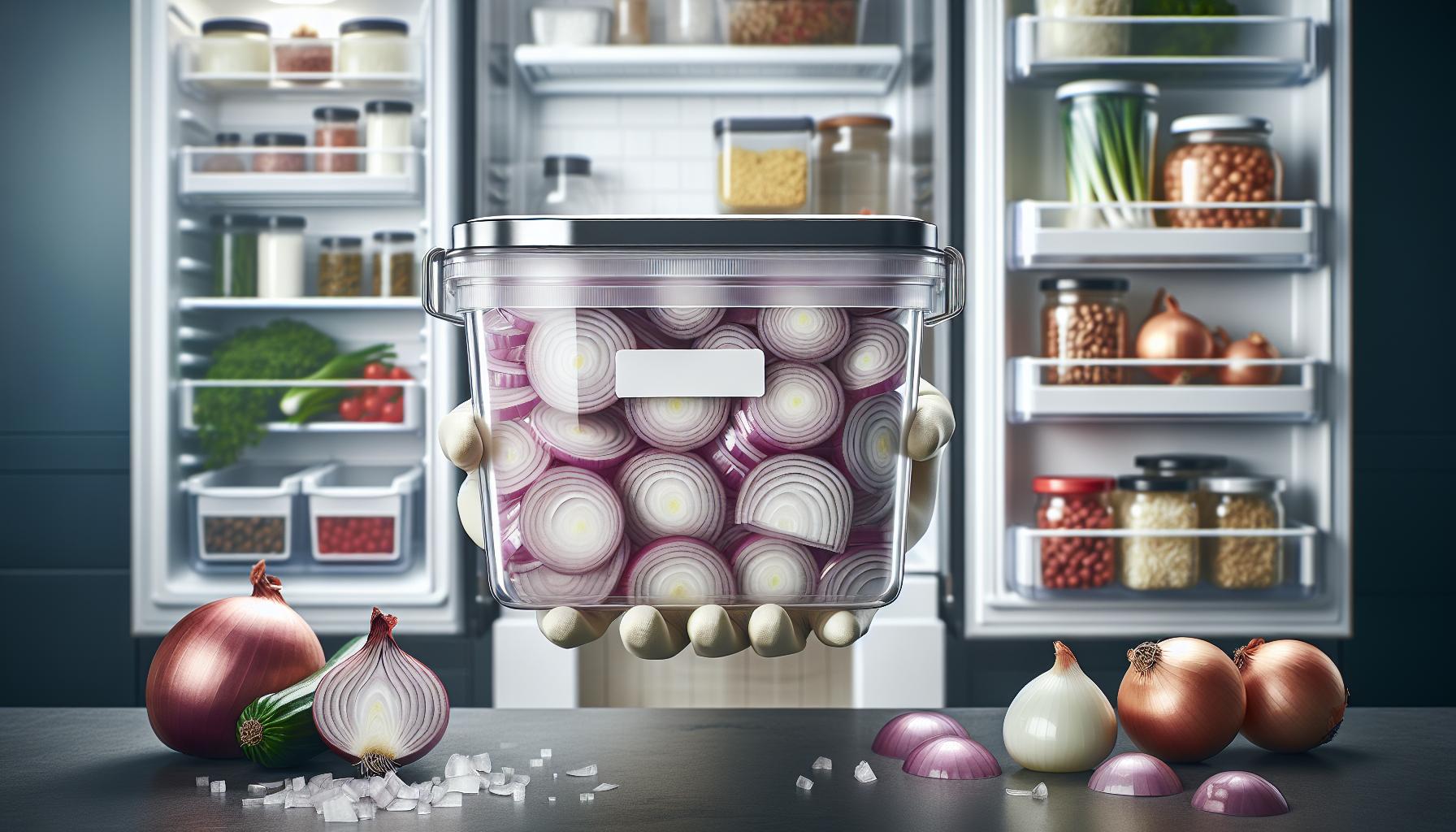
Proper Storage Techniques for Chopped Onions
Chopped onions can bring exceptional flavor to your dishes, but they also require proper handling to ensure they stay fresh for as long as possible. When stored correctly, chopped onions can last in the fridge for about 7 to 10 days. Here are some effective storage techniques to keep your chopped onions in good condition, ensuring you minimize food waste and maintain their quality.
To start, always use a clean container for storing chopped onions. Glass or plastic containers with airtight lids are excellent choices. They not only prevent odors from permeating your fridge but also protect the onions from humidity, which can cause spoilage. Be sure to dry any moisture from the chopped onions before placing them in the container, as excess moisture can accelerate decay.
In terms of location within your fridge, it’s best to store the chopped onions on a middle shelf rather than in the crisper drawer. The crisper drawer is designed for high moisture and can trap humidity, which is not ideal for onion storage. Keeping them at a moderate temperature in an airtight container will help maintain their quality and flavor for longer.
If you have significant amounts of chopped onions that you won’t use within the week, consider freezing them. Spread the chopped onions on a baking sheet in a single layer and freeze until solid. Once frozen, transfer them to a freezer-safe bag or container to prevent freezer burn. When you need them, you can use the frozen onions directly in your recipes without thawing, which is a convenient way to reduce waste while enjoying their flavor later on.
By implementing these storage strategies, you can extend the lifespan of your chopped onions, ensuring they remain fresh and flavorful for your meals. Remember to regularly check for any signs of spoilage, and always store onions in the appropriate conditions to enjoy them at their best.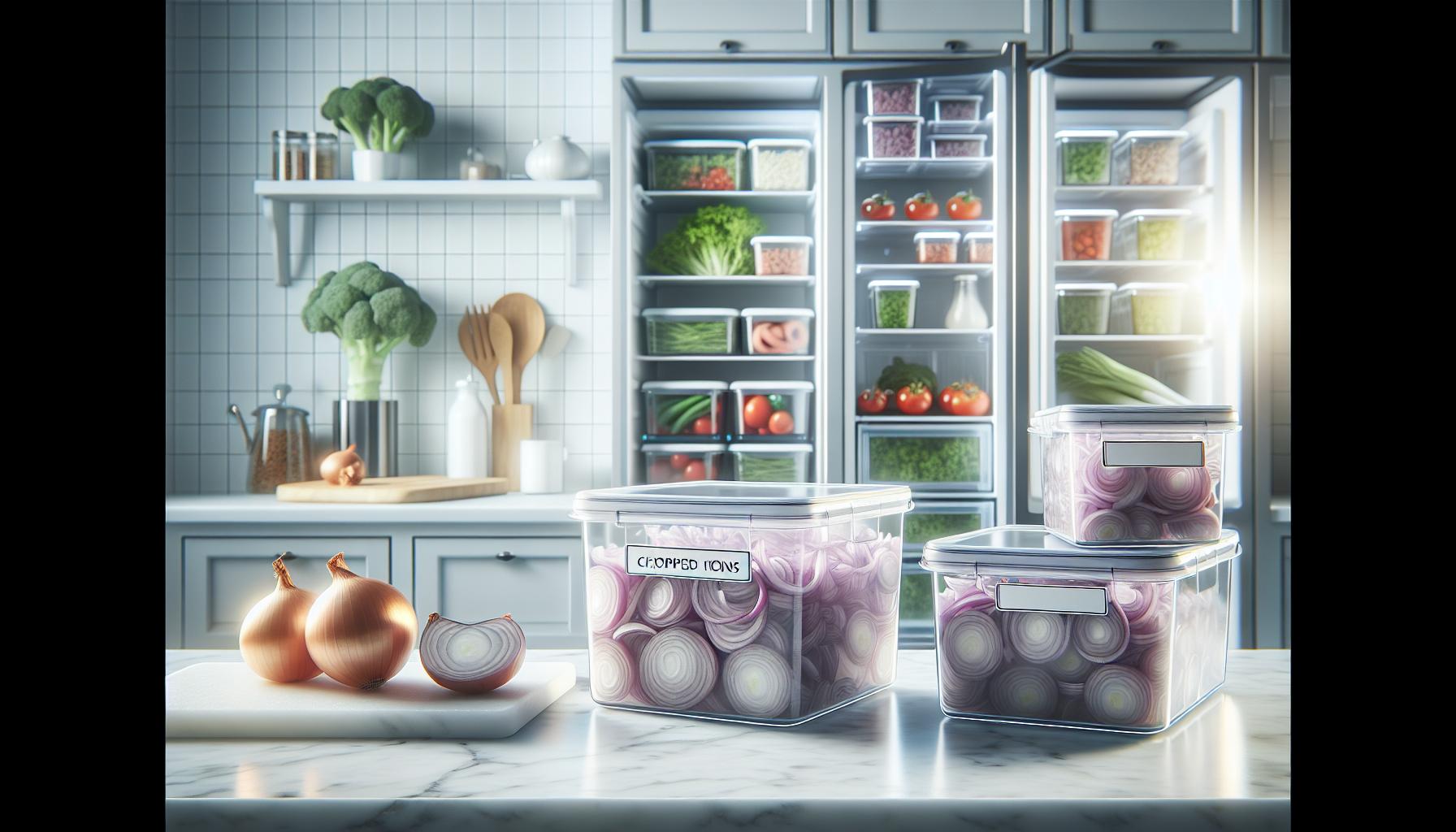
Best Containers for Storing Chopped Onions
Chopped onions are a kitchen staple that can elevate any dish, but proper storage is crucial to maintain their freshness and flavor. When it comes to keeping your chopped onions in optimal condition, selecting the right container can make all the difference. Using the appropriate storage container not only helps prevent spoilage but also controls odor distribution in your fridge, ensuring a pleasant culinary environment.
Glass Containers are often the top choice for storing chopped onions. They are non-porous, easy to clean, and do not retain odors, which is particularly beneficial for storing pungent foods like onions. Look for containers with airtight lids, as this prevents moisture from entering and keeps your onions crisp. Additionally, glass containers can be placed in the microwave or oven (if they are oven-safe), offering versatility for meal prep and reheating.
Plastic Containers also serve as a convenient option, particularly those specifically designed for food storage. Choose BPA-free, airtight varieties that keep moisture out and help preserve the onions’ texture and flavor. Clear plastic containers allow for easy visibility of contents, making it easier to assess if your onions are still good to use. While plastic containers are lighter and often less expensive than glass, they may not be as durable over time.
Freezer Bags
are an excellent choice if you plan to store your chopped onions for a more extended period. These bags are designed to seal tightly and prevent freezer burn, making them ideal for freezing chopped onions. To use, spread the chopped onions in a single layer in the bag, remove as much air as possible, and seal. Label the bags with the date for easy reference; frozen chopped onions can last up to six months, maintaining their flavor and texture.
In summary, whether you prefer the sturdiness of glass or the convenience of plastic, choosing the right container is vital for storing chopped onions effectively. By utilizing airtight glass containers, durable plastic options, or freezer bags, you can ensure your chopped onions stay fresh and flavorful, minimizing waste and maximizing your culinary creativity.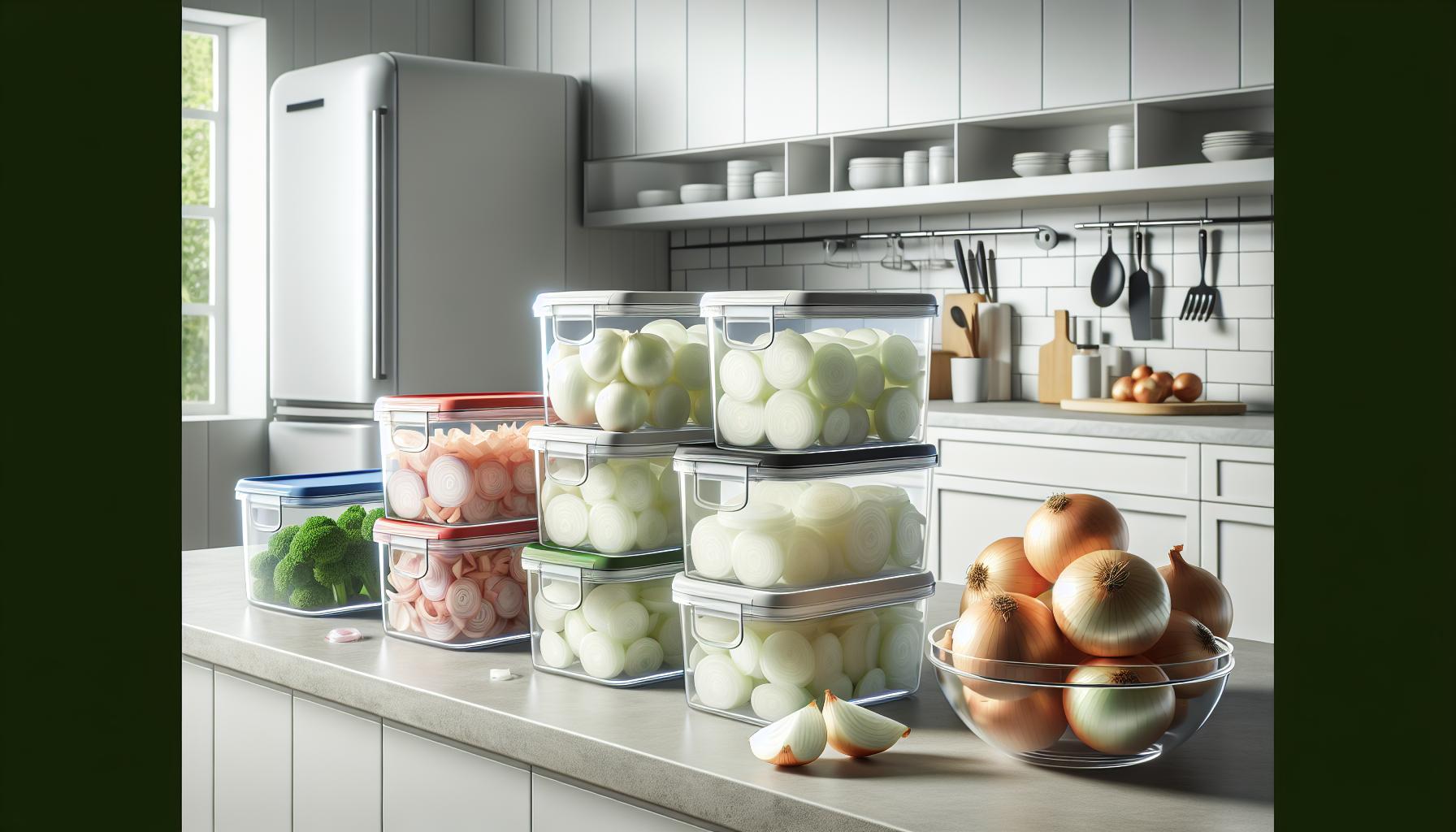
Freezing Chopped Onions: A Step-by-Step Guide
Freezing chopped onions is an excellent way to preserve their freshness and minimize food waste. This method not only extends their shelf life but also allows for convenient meal preparation. When done correctly, frozen chopped onions can retain their flavor and texture for up to six months. Here’s a straightforward, step-by-step guide to ensure successful freezing.
Start by selecting fresh onions. Choose firm, unblemished onions, as the quality of the onions before freezing will impact the end product. Peel and chop your onions as desired-dicing or slicing based on your future cooking needs. Once chopped, it’s essential to blanch the onions briefly to maintain their flavor and color. For onion pieces, blanch for two to three minutes in boiling water, then transfer them immediately to an ice bath to stop the cooking process. This step is crucial as it helps preserve the texture and prevents the onions from becoming mushy when thawed.
After blanching, drain the onions thoroughly and spread them out in a single layer on a baking sheet lined with parchment paper. This method prevents the pieces from sticking together. Place the baking sheet in the freezer for about an hour or until the onions are completely frozen. Once frozen, transfer the onion pieces into freezer bags or airtight containers. Be sure to remove as much air as possible from the bags before sealing to reduce the risk of freezer burn. Label each bag or container with the date and contents to keep track of storage time.
When you’re ready to use your frozen chopped onions, there’s no need to thaw them beforehand for most recipes. Simply toss them directly into your cooking dishes; they will cook down quickly and blend seamlessly with other ingredients. This not only saves you time but also ensures that you’re making the most of your kitchen resources while reducing potential food waste. Enjoy the convenience of having prepped onions ready to enhance your meals at a moment’s notice!
Using Leftover Chopped Onions: Recipe Ideas
Chopped onions are a versatile ingredient that can enhance a plethora of dishes, and finding creative ways to use them is essential for minimizing waste. If you’ve got leftover chopped onions sitting in the fridge, consider transforming them into delightful meals that will have your family asking for seconds. One quick and flavorful option is to sauté them with bell peppers and garlic as a base for stir-fries. Throw in your choice of protein-be it chicken, beef, tofu, or shrimp-and you’ll have a satisfying dinner ready in no time.
Another fantastic use for leftover chopped onions is incorporating them into omelets or frittatas. Simply mix the onions with beaten eggs, add some cheese and vegetables, and cook them up for a nutritious breakfast or brunch. If you’re in the mood for something lighter, toss the chopped onions into a fresh salad. Their crunch can contribute significantly to the texture, while their flavor can be mellowed by pairing them with creamy dressings, avocados, or citrus fruits.
For a comforting main dish, consider making a savory onion soup. Sauté the leftover chopped onions until they caramelize, then add broth, herbs, and a splash of wine for depth of flavor. Top this dish with some toasted bread and melted cheese for a classic French onion soup experience. Alternatively, you can blend them into sauces, such as tomato sauce for pasta or a curry sauce, thereby infusing your meals with rich layers of taste.
Taking advantage of leftover chopped onions is not only a way to reduce waste but also a great opportunity to experiment with flavors in your kitchen. When stored properly in an airtight container in the refrigerator, chopped onions can last for up to seven days. Always check for signs of spoilage, such as discoloration or an off smell, before use. By incorporating these ideas, you can ensure that you’re making the most of your ingredients while enjoying a variety of delicious meals.
Minimizing Food Waste: Smart Onion Storage Tips
Chopped onions often end up as leftovers, and knowing how to store them effectively can significantly reduce food waste. Onions are perishable, and when stored properly, you can extend their shelf life, ensuring they remain fresh and ready for your next culinary creation. By implementing some straightforward storage techniques, you can keep your chopped onions in optimal condition for up to seven days.
To start, choose a suitable container for storing your chopped onions. A hermetically sealed container is an excellent choice as it minimizes exposure to air, which can hasten spoilage. Glass or BPA-free plastic containers work particularly well. Ensure that the container is completely clean and dry before transferring your chopped onions to avoid any unwanted moisture that can promote bacterial growth. As an additional tip, consider placing a paper towel in the container to absorb excess moisture, helping to extend freshness.
When you’re ready to store your chopped onions in the refrigerator, place them on a shelf rather than in the door, where temperatures can fluctuate more significantly. Ensure the fridge is set to a temperature below 40°F (4°C) to keep food at a safe temperature. Before using stored onions, always perform a quick inspection: check for any slimy texture, off-color, or strong odor, which are indicators of spoilage. If they appear compromised, it’s best to discard them to avoid any health risks.
For those wanting to get ahead of their meal prep, consider freezing any excess chopped onions. Spread the onions on a baking sheet in a single layer and freeze them until solid. Once frozen, transfer them to an airtight freezer bag or container, where they can last for several months. This way, not only do you minimize food waste, but you also have chopped onions readily available for your future meals, adding both convenience and flavor to your dishes without additional effort.
Understanding Onion Shelf Life: Whole vs. Chopped
When it comes to the shelf life of onions, understanding the difference between whole and chopped onions is essential for reducing food waste and ensuring food safety. Whole onions can last several weeks to months when stored properly in a cool, dry, and dark place. Unlike their chopped counterparts, whole onions have an intact skin that protects them from air and moisture, which are key factors in spoilage. Typically, whole yellow and red onions can last up to 2-3 months under optimal conditions, while sweet onions have a shorter shelf life of about 1-2 months.
In contrast, once onions are chopped, their shelf life dramatically decreases due to increased exposure to air and moisture. Chopped onions should be stored in the refrigerator and are best used within 7 days for optimal freshness and safety. This shorter lifespan is attributed to the breakdown of cell structure during chopping, leading to expedited spoilage. Reduced quality can manifest as a strong odor, slimy texture, or discoloration. To avoid health risks, it’s crucial to regularly inspect stored chopped onions and discard them if any signs of spoilage are present.
To enhance longevity and maintain quality, proper storage techniques are vital. Chopped onions should be kept in airtight containers or sealed bags to limit exposure to air. Investing in quality storage solutions can make a significant difference in preserving the freshness. For those who find themselves with excess chopped onions, freezing is a fantastic alternative. Chopped onions can be frozen for up to 3 months, allowing you to retain the flavor and convenience of onions for future meals, further reducing waste and promoting efficiency in meal preparation. By understanding these differences and storage methods, you can maximize the life of your onions and enjoy their delicious benefits without the worry of spoilage.
Health Risks of Storing Onions Improperly
Improperly stored chopped onions can pose serious health risks, primarily due to the increased likelihood of bacterial growth and spoilage. Once onions are chopped, their cell walls break down, creating a moist environment that is ideal for bacteria and molds to thrive. Pathogens such as Salmonella or E. coli can potentially contaminate onions and lead to foodborne illnesses if consumed, particularly if they are left out at room temperature for extended periods. The breakdown of the onion’s natural barriers shortens their shelf life significantly, emphasizing the importance of proper storage practices.
To avoid health risks, it’s essential to be vigilant about how chopped onions are stored. Here are some best practices:
- Refrigeration: Always store chopped onions in the refrigerator at temperatures below 40°F (4°C). They should be used within 7 days for optimal freshness and safety.
- Airtight Containers: Use airtight containers or resealable bags to minimize exposure to air, which can accelerate spoilage and increase the risk of contamination.
- Regular Inspections: Frequently check stored onions for any signs of spoilage, such as an off smell, sliminess, or discoloration. Discard any that show these signs immediately.
In addition to bacterial growth, improper storage can lead to the development of unpleasant flavors and textures, making your food less enjoyable. Even if bacteria do not pose an immediate threat, consuming spoiled onions can lead to digestive issues or food waste if they are beyond salvaging. Understanding how to handle and store chopped onions properly not only protects your health but also contributes to minimizing food waste by allowing you to use every bit of your groceries effectively. By adhering to these simple yet effective storage guidelines, you can ensure that your onions remain safe and tasty to eat.
How Long Do Other Vegetables Last in the Fridge?
Knowing how long different vegetables can last in the fridge is essential for reducing food waste and ensuring you consume your groceries while they are still fresh. Each vegetable has a unique shelf life, influenced by factors such as moisture content and temperature. For instance, leafy greens like spinach and lettuce typically last 3 to 7 days. Keeping them in a breathable bag or container helps maintain their crispness while minimizing moisture buildup that can lead to spoilage.
Starchy vegetables also show varied lifespans when stored correctly. Carrots, for example, can last up to 2-4 weeks if kept in a plastic bag with holes for airflow, preventing them from becoming limp. Potatoes should ideally be stored in a cool, dark place rather than in the fridge, where they can develop a sweeter flavor and change texture.
Vegetable Shelf Life Table
| Vegetable | Shelf Life in the Fridge |
|---|---|
| Leafy Greens (e.g., spinach, kale) | 3-7 days |
| Carrots | 2-4 weeks |
| Bell Peppers | 1-2 weeks |
| Cucumbers | 1 week |
| Broccoli | 3-5 days |
| Tomatoes | 1 week (best at room temperature) |
To maximize freshness, store vegetables in high-humidity crisper drawers and separate ethylene-producing fruits, like apples and bananas, which can hasten spoilage. The right storage conditions not only prolong vegetable life but also enhance the taste and texture of your meals. Emphasizing these practices can lead to a more sustainable kitchen with less wasted food.
Tackling Food Waste: Creative Uses for Onions
One of the most versatile ingredients in the kitchen, onions can transform a dish with their robust flavor and aroma. When facing an excess of chopped onions, instead of letting them go to waste after their optimal storage time has passed (typically about 7 to 10 days in the fridge), consider these creative ways to incorporate them into your meals and reduce food waste effectively.
For starters, chopped onions can be a fantastic base for stocks and broths. Simply sauté your leftover onions with some garlic and other vegetables, add water or broth, and let it simmer. This provides a flavorful liquid for soups, stews, or risottos. Additionally, try adding them to scrambled eggs or omelets for a hearty breakfast that also makes use of your leftover onions.
You can also incorporate them into savory baked goods. Onions can enhance the taste of quiches or savory muffins. For an innovative twist, consider caramelizing your chopped onions first to bring out their natural sweetness before adding them to any dish. This not only elevates the flavor but also makes them a delightful topping for pizzas or mixed into pasta sauces.
Lastly, if you’re feeling adventurous, incorporate chopped onions into homemade pickles. Mixing onions with vinegar, herbs, and spices creates a tangy condiment that pairs well with sandwiches, burgers, and salads. By using these strategies, you can ensure that your chopped onions find a purpose in your cooking, minimizing waste and maximizing flavor.
Faq
Q: How can you tell if chopped onions are bad?
A: Chopped onions are bad if they have a slimy texture, a sour or off smell, or visible mold. Fresh onions should be crisp and have a strong, pungent scent. If you notice any of these signs, it’s best to discard them to avoid health risks.
Q: Can you store chopped onions with other vegetables?
A: It’s not recommended to store chopped onions with other vegetables as they can cause them to spoil faster due to the release of ethylene gas. For optimal freshness, keep onions in a separate airtight container in the fridge to minimize cross-contamination.
Q: How long do cooked onions last in the fridge?
A: Cooked onions can last about 3 to 5 days in the fridge when stored properly in an airtight container. Make sure they are cooled before refrigerating to maintain quality and prevent bacterial growth.
Q: Can you freeze chopped onions?
A: Yes, you can freeze chopped onions. To do this, spread them in a single layer on a baking sheet to freeze first, then transfer to an airtight freezer bag. Frozen chopped onions can last up to 6 months.
Q: Do cooked onions need to be refrigerated?
A: Yes, cooked onions need to be refrigerated within two hours of cooking to prevent bacterial growth. Store them in an airtight container to keep them fresh for 3 to 5 days.
Q: What is the best way to store chopped onions in the fridge?
A: The best way to store chopped onions in the fridge is in an airtight container placed in the vegetable drawer. This method minimizes exposure to air, preventing spoilage and strong odors from affecting other foods.
Q: How can you minimize food waste with chopped onions?
A: Minimize food waste with chopped onions by using smart storage techniques, such as keeping them in airtight containers, labeling with dates, and incorporating any leftovers into meals within a few days. Consider freezing excess chopped onions for later use.
Q: Is it safe to eat slightly spoiled chopped onions?
A: It is not safe to eat slightly spoiled chopped onions. If they show signs of spoilage, like a bad odor or sliminess, it’s best to discard them to avoid foodborne illness. Always err on the side of caution with food safety.
Concluding Remarks
To prevent food waste and maximize the freshness of your chopped onions, remember that they generally last about 7 to 10 days in the fridge when stored properly. If you’re looking to extend their lifespan, consider using airtight containers or freezer bags that minimize oxygen exposure. For further tips on effective food storage, check out our articles on safe food storage practices and the best containers for keeping your produce fresh.
Don’t let your hard work in the kitchen go to waste-take action today by implementing these storage strategies! If you have any lingering questions or want more insights, feel free to share in the comments or explore our related resources. Join our newsletter for the latest tips on food safety and storage, and ensure your meals are both delicious and safe! Together, we can make smarter food choices and reduce waste effectively.

